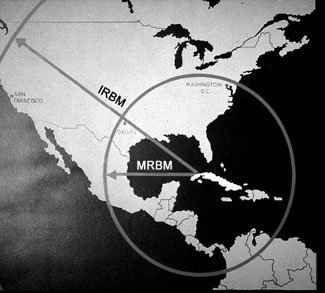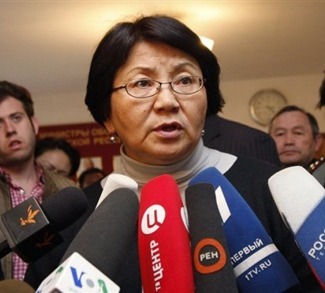FORECAST
In a move harkening back to the Cold War, Russia has threatened to respond militarily and technologically to U.S plans for a missile defence system in Central Europe, plans that could re-trigger an arms race.
The threat follows on the heels of an announcement that US Secretary of State Condoleezza Rice signed a formal agreement with the Czech Republic to host the radar for the controversial project. The US has also been courting Poland, its other proposed partner, to host interceptor missiles designed to shoot down any incoming rockets.
Washington claims that the system, endorsed by NATO this April, will aid in combating the common enemy that is terrorism (in the form of North Korean and especially Iranian nuclear ambitions) and be a significant building block for the security of the international community as a whole, while bolstering existing US defense in California, Alaska, and the UK. However the Kremlin is not buying such claims and views the proposed system as a hostile move targeted against Russia that could re-trigger an arms race while severely undermining the balance of European security and Russian interests in the former Soviet bloc. In short, the missile defense system is a pretext for US and NATO incursion into the region.
Iran’s recent missile tests lend credence to Russian skepticism of US motives because the limited range of Iranian missiles would not be able to reach Europe, thus negating the threat of attack. As a result, newly inaugurated Russian President Dmitri Medvedev has promised to respond militarily and technologically including possibly withdrawing from the 1987 Intermediate-Range Nuclear Forces Treaty if the US goes through with its unilateral security policy in Russia’s former backyard.
Disagreement over the missile defense system marks another chapter in tensions between Russia and the US. Under the leadership of Medvedev’s predecessor, President Vladimir Putin, Russia engaged in a balance of power to counter US hegemony, a strategy that has played out in disagreements over the self-determination and/or foreign policies of Kosovo, South Ossetia, Georgia, Ukraine, Iran, and Zimbabwe, as well as US conduct in the “war on terror”.
With Medvedev taking up the mantle of Putin’s anti-American rhetoric, and Iran’s nuclear ambitions stoking US fears and driving its military complex in conducting the “war on terror”, tensions are likely to continue and may reach a flash point before President Bush leaves office in January 2009.
The goal of the US missile defense system is to establish a defensive shield surrounding the US that would target and destroy incoming intercontinental ballistic missiles (ICBMs). The concept is the brainchild of President Ronald Reagan’s administration, whose Strategic Defense Initiative, or Star Wars, was designed in 1983 to protect the US from a Soviet missile attack. The controversial program never materialized and it slipped from the agenda of succeeding presidents, however, missile defense became a top priority of the Bush administration after 9/11.
On June 13, 2002, the US pulled out of the 1972 anti-ballistic missile (ABM) treaty—an agreement signed by the US and the Soviet Union to prohibit the development of a missile defense system.
SUMMARY OF EVENTS: July 7 – 14, 2008
WORLD
Oil prices rocketed to records above $147 on Friday as traders seized on the weak US currency, simmering tensions over crude producers Iran and Nigeria and news of a looming strike in Brazil.
Russia and China vetoed a U.S.-drafted resolution in the UN Security Council on Friday that would impose sanctions on Zimbabwe over the country’s presidential run-off election in late June.
NORTH AMERICA
United States
The American Dream featuring a home in the suburbs and two cars in the garage is now under review due to a hefty price tag in the form of the cost of gasoline needed to commute to work and the supermarket.
The US Senate on Wednesday passed a bill expanding legal authority for electronic wiretaps by spy agencies, handing victory to President George W. Bush after a standoff over anti-terror strategy.
The Bush administration is committed to a nuclear cooperation agreement with India and will push for congressional approval once India finishes work on the deal, the State Department said on Wednesday.
WESTERN EUROPE
United Kingdom
The Bank of England decided on Thursday to hold its key short-term interest rate at 5 percent in the face of high inflation, sliding economic growth and a housing market downturn.
EASTERN EUROPE
Poland
Polish Prime Minister Donald Tusk said his country could reach agreement with the United States within two weeks on a missile defense shield but indicated he would not compromise on tough conditions he has set for a deal.
Russia
Russia’s foreign minister said on Friday that Iran’s recent missile tests show it does not have ability to attack Europe, and disprove the U.S. justification for a missile shield in Central Europe.
MIDDLE EAST
Hamas leaders plan to hold talks with Egyptian officials in Cairo on the future of a ceasefire with Israel that has been marred by violations since it began nearly three weeks ago.
Palestine / Israel
Taps have run dry in West Bank towns and Palestinians face acute water shortages as dry weather strains supplies already restricted by Israel, residents and the water authority said.
Iran
The U.S. Navy said on Monday it was carrying out an exercise in the Gulf, days after vowing that Iran will not be allowed to block the waterway, which carries crude from the world’s largest oil-exporting region.
Iran has resumed work on constructing highly sophisticated equipment that nuclear experts say is primarily used for building atomic weapons, according to the latest intelligence reports received by Western diplomats.
Iran will hit Tel Aviv, U.S. shipping in the Gulf, and American interests around the world if it is attacked over its disputed nuclear activities, an aide to Iran’s Supreme Leader was quoted as saying on Tuesday.
Iran tested more missiles in the Gulf on Thursday, state media said, and the United States pledged to defend its allies against any Iranian aggression.
Iraq
Iraqi Prime Minister Nuri al-Maliki raised the prospect on Monday of setting a timetable for the withdrawal of U.S. troops as part of negotiations over a new security agreement with Washington.
Iraq’s Defence Ministry on Friday denied any Israeli air force drills had taken place in its airspace after a report that the Israelis were preparing there for a possible strike on Iran.
Syria
Syrian President Bashar al-Assad is set to begin a three-day visit to France on Saturday, seeking to make headway in the push by Damascus to break out of diplomatic isolation.
EAST ASIA
China
China’s economy will overtake that of the United States by 2035 and be twice its size by mid-century, a study released Tuesday by a US research organization concluded.
North Korea
Negotiators resumed talks Thursday on North Korea’s nuclear disarmament, with hopes of laying out a program for what could be a lengthy attempt to verify the country’s declaration of its atomic materials.
SOUTH ASIA
Afghanistan
Afghanistan’s interior ministry has accused a foreign intelligence agency of involvement in a suicide attack on the Indian embassy in Kabul Monday that killed 41 people.
AFRICA
The International Monetary Fund (IMF) is augmenting an existing facility and reshaping a second to help countries worst hit by the food and fuel price crisis, especially in sub-Saharan Africa.
Nigeria
The main militant group in Nigeria’s oil-producing Niger Delta said on Thursday it was abandoning a ceasefire, in protest at a British offer to help tackle lawlessness in the region.
Sudan
Suspected Janjaweed militia have ambushed the beleaguered UN mission in Sudan’s war-torn Darfur region, with one peacekeeper confirmed dead and another six missing, an official said on Wednesday.
Zimbabwe
The Group of Eight agreed on Tuesday to impose targeted sanctions against leading Zimbabwean officials after a violent election last month that extended President Robert Mugabe’s 28-year rule.
Marsha Reid is a contributor to Geopoliticalmonitor.com



